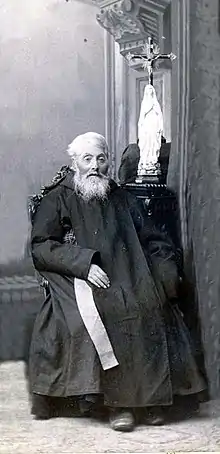Peter Kharischirashvili
Peter Kharischirashvili[1] (in Georgian: პეტრე ხარისჭირაშვილი / ხარისჭარაშვილი, born in 1804 or 1805 in Akhaltsikhe, Russian Empire – 7 October 1890 in Constantinople) was a Georgian Catholic monk, theologian and public figure, scientist and founder of the Servites of the Immaculate Conception in Istanbul.
Peter Kharischirashvili | |
|---|---|
 | |
| Personal | |
| Born | 1804 |
| Died | 7 October 1890 |
| Religion | Catholic Church |
| Nationality | Georgian |
| Military service | |
| Rank | Priest |
| Senior posting | |
| Ordination | 1842 |
Biography
Early years
Peter Kharischirashvili was born in 1804 or 1805 in Akhaltsikhe, according to most sources.[2][3] According to his tombstone, Kharischirashvili was born on May 2, 1818, which is the date accepted by Zakaria Chichinadze.[3] Meanwhile, other sources give his birth date as April 20, 1818.[4]
He studied at the parochial school and later went to study at the seminary in Gyumri, and finally to Rome to study Superior Theology.
Priesthood and last years in Georgian lands
In 1842 he returned to Akhaltsikhe, there he was ordained, and was appointed assistant archimandrite to Pavle Shahqulianis.[2][4] His return to Georgia also meant an awareness and a determination to fight so that the Georgian Catholics could worship God in their language.[2][5]
Kharischirashvili captivated his faithful thanks to his eloquent preaching. Despite obeying the law and celebrating in Armenian, he preached in Georgian. He worked hard to improve the situation of his people, exempting the dowry for women with few resources, and teaching people to read and write.[2] His authority, however, aroused suspicions among the Armenians. The tensions reached their highest point when the Armenians announced the decision to build a seminary at Akhaltsikhe and Shahqulianis supported them. Kharischirashvili faced him and, finally was sent to Khizabavra, and from there to Vale.[2]
In the 1850s he was transferred to Khizabavra (today's Aspindza region).
Sacerdotal life abroad
In 1856 he marched to Venice, where he joined the Mekhitarist Congregation and founded a Georgian press and published a number of significant historical and theological books in the Georgian language on St. Lazarus Island. Kharischirashvili also translated books from Armenian, which he has reconciled with that community. Thanks to his work, the Holy See allowed him to found in Constantinople a new Georgian religious congregation on May 7, 1859 in Constantinople and also a typikon there.[2][4] Upon his arrival he founded the congregation of the Servites of the Immaculate Conception and began to celebrate the liturgy in Georgian.[2] A female monastery and a Catholic school were also founder. Each year the school had more than 100 students, many of them Georgian slaves repurchased by Kharischirashvili himself, and others who came from Georgia.[2] His work also attracted Orthodox and Muslim Georgians.[2]
In 1861, Kharischirashvili founded a church to Georgian Catholics in one of the most prestigious districts of Istanbul.
Kharischirashvili spoke eight languages, but he paid particular attention to Georgian teaching. In addition to theological work, his congregation and school also had a significant presence in the Georgian language and grammar, literature and history, and students were also introduced to Latin and French. Their pupils were aware of the excerpts from The Knight in the Panther's Skin. Of the school were students, among others, Michel Tamarati and Mikheil Tarkhnishvili. In 1870 he founded a new Georgian press in Constantinople, and many of the books distributed free of charge to poor people. He paid special attention to the fact that the editions were careful and were grammatically correct. Among the published works is the publication of poetry "ყვავილების კონა" (qvavilebis kona). The good march of the congregation caused that a new house and printer in Montauban (France) also had been opened in that decade. Only in 1877-81, this printout was printed and spread over 25 different books in Georgia. The Georgian language was used to protect the purity of the Georgian language and started to draw grammar. While the Georgian Orthodox Church had confiscated its autocephaly and did not participate in the development of Georgian language and literature, the Istanbul monastery continued the work of Gregory of Khandzta.
Death
He died on October 7, 1890 in Istanbul (other sources say October 9).[4] His headstone says:
OSSA PETRI CARISCIARANTI / GEORGIA DOMO DOMO AKALCIK / SERVORUM / ANCILLARUMQUE VIRGINIS / AB IMMACULATO CONCEPTU / INSTITUTORIS / AC MODERATORIS GENERALIS PRIMI / PIISSIMA VITA CESSIT / VII ID OCT MDCCCXC / VIXIT ANNOS LXXII MONTHS V TWELFTH XXVI RI P ".[6]
Bibliography
- ბლუაშვილი, უჩა (2008). მესხეთის სახელოვანი შვილები / Славные сыновья Месхети (in Georgian and Russian). საქართველოს პარლამენტის ეროვნული ბიბლიოთეკა. pp. 70-76, 175-180. ISBN 978-9941-0-1076-7.
- ჭიჭინაძე, ზაქარია (1895). აბატი პეტრე ხარისჭირაშვილი. შარაძისა და ამხანაგობის სტამბა.
- Dalleggio, Eugène; Čičinaże, Zak'aria (2003). İstanbul Gürcüleri (in Turkish). Translated by Fahrettin Çiloğlu. Sinatle Yayınları. pp. 43-50. ISBN 9789758260157.
- კურტანიძე (Kurtanidze), ლ (L) (2002). "პეტრე ხარისჭირაშვილი და" სიბრძნე კაცობრივი " ". კავკასიის მაცნე / Caucasian Messenger (5). ISSN 1512-0619.
References
- Also written as Carisciarian, Caristchiarianti, Karishiaranti, Kharistchirashvili, Kharistshirashvili, Harisçiraşvili, Krischiaranti, Харисчирашвили.
- ბლუაშვილი, უჩა (2008). მესხეთის სახელოვანი შვილები / Славные сыновья Месхети (in Georgian and Russian). საქართველოს პარლამენტის ეროვნული ბიბლიოთეკა. pp. 70-76, 175-180. ISBN 978-9941-0-1076-7.
- Zakaria Chichinadze (1895). აბატი პეტრე ხარისჭირაშვილი . შარაძისა და ამხანაგობის სტამბა.
- Dalleggio, Eugene; Čičinaże, Zak'aria (2003). İstanbul Gürcüleri (in Turkish). Translated by Fahrettin Çiloğlu. Sinatle Yayınları. p. 44. ISBN 9789758260157.
- In the Russian Empire the Byzantine liturgy was reserved for the Georgian Orthodox, and Catholics could only celebrate the Armenian rite (Armenian language) or Roman rite (in Latin language).
- Natsvlishvili, Natia (2015). "A struggle for identity: Georgian Catholics and their monastery in Istanbul". Caucasus Survey 3 (1). ISSN 2376-1199